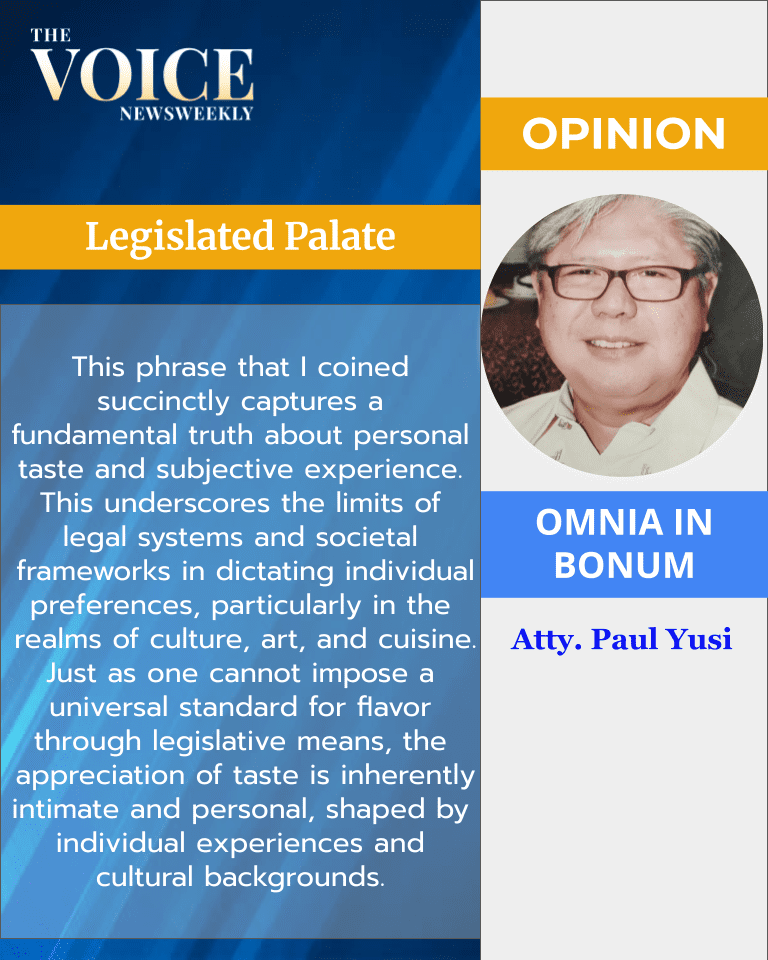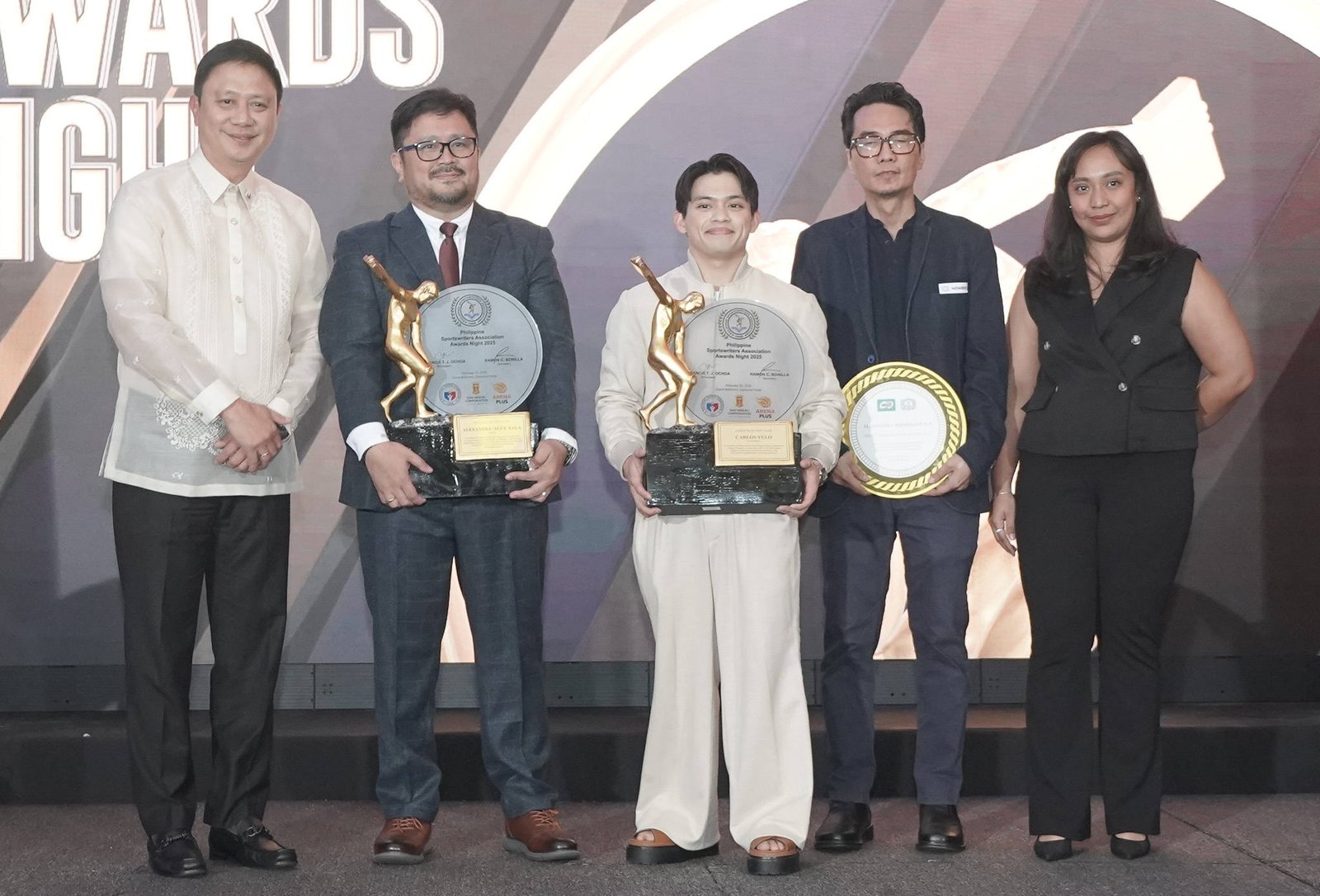𝗢𝗺𝗻𝗶𝗮 𝗶𝗻 𝗕𝗼𝗻𝘂𝗺 𝗯𝘆 𝗔𝘁𝘁𝘆. 𝗣𝗮𝘂𝗹 𝗬𝘂𝘀𝗶
With the recent veto of the bill designating our beloved province Pampanga as the “Culinary Capital of the Philippines”, I can only console myself in the reality that the palate cannot be legislated, but should be appreciated.
This phrase that I coined succinctly captures a fundamental truth about personal taste and subjective experience. This underscores the limits of legal systems and societal frameworks in dictating individual preferences, particularly in the realms of culture, art, and cuisine. Just as one cannot impose a universal standard for flavor through legislative means, the appreciation of taste is inherently intimate and personal, shaped by individual experiences and cultural backgrounds.
Legislation often aims to create uniformity and order within society, regulating behaviors and standards to ensure a level of conformity among its citizens. However, when it comes to appreciation—whether of food, art, or music—the nuances of personal preference resist such uniformity.
A law may not dictate what flavors should bring joy or satisfaction. For instance, a court can rule that a specific dish is permissible to serve but cannot ensure that all diners will love it. Taste is not an absolute measure; it varies wildly from one individual to another and is influenced by myriad factors including geography, upbringing, and openness to new experiences.
Moreover, the very act of appreciating taste invites an exploration into identity and culture. Culinary diversity reflects the rich difference of human experience, where different cultures celebrate their unique ingredients, cooking methods, and flavor pairings. The joy of food lies in its ability to evoke memories, transport individuals to distant lands, or connect communities. Thus, legislating taste can result in a sterile landscape devoid of the personal and cultural significance that makes food and art truly special.
In this context, my position serves as a reminder of the importance of fostering environments where individual preferences are celebrated rather than constrained. Encouraging culinary exploration and artistic expression enriches the human experience, allowing for a myriad of flavors and expressions that cannot be boxed into legislative mandates. Ultimately, it is through appreciation, open-mindedness, and dialogue that we can truly honor the diversity of the human palate—a celebration of life’s richness that no law can encapsulate.
This is particularly true when Kapampangans say they love and miss “buro” so much, or “tugak batute”, or “camaru”. An acquired taste that not so many of our countrymen in other parts share with us.
In sum, the veto explanation is acceptable to me.
About the Author: 𝐴𝑡𝑡𝑦 𝑃𝑎𝑢𝑙 𝑌𝑢𝑠𝑖 𝑖𝑠 𝑙𝑎𝑤𝑦𝑒𝑟-𝑏𝑢𝑠𝑖𝑛𝑒𝑠𝑠𝑚𝑎𝑛 𝑝𝑟𝑖𝑛𝑐𝑖𝑝𝑎𝑙𝑙𝑦 𝑒𝑛𝑔𝑎𝑔𝑒𝑑 𝑖𝑛 𝑠𝑒𝑐𝑢𝑟𝑖𝑡𝑦 𝑠𝑒𝑟𝑣𝑖𝑐𝑒𝑠. 𝐻𝑒 𝑤𝑎𝑠 𝑎𝑛 𝑒𝑥-𝑔𝑜𝑣𝑒𝑟𝑛𝑚𝑒𝑛𝑡 𝑙𝑎𝑤𝑦𝑒𝑟 𝑎𝑡 𝑡ℎ𝑒 𝑂𝑆𝐺 𝑎𝑛𝑑 𝑙𝑎𝑡𝑒𝑟 𝑠𝑒𝑛𝑖𝑜𝑟 𝑐𝑜𝑟𝑝𝑜𝑟𝑎𝑡𝑒 𝑐𝑜𝑢𝑛𝑠𝑒𝑙 𝑓𝑜𝑟 𝑠𝑜𝑚𝑒 𝑜𝑓 𝑡ℎ𝑒 𝑏𝑖𝑔𝑔𝑒𝑠𝑡 𝑏𝑢𝑠𝑖𝑛𝑒𝑠𝑠 𝑐𝑜𝑛𝑔𝑙𝑜𝑚𝑒𝑟𝑎𝑡𝑒𝑠 𝑖𝑛 𝑡ℎ𝑒 𝑃ℎ𝑖𝑙𝑖𝑝𝑝𝑖𝑛𝑒𝑠. 𝐻𝑒 𝑖𝑠 𝑎𝑐𝑡𝑖𝑣𝑒 𝑖𝑛 𝑠𝑜𝑐𝑖𝑜-𝑐𝑖𝑣𝑖𝑐 𝑎𝑐𝑡𝑖𝑣𝑖𝑡𝑖𝑒𝑠 𝑎𝑛𝑑 𝑐𝑢𝑟𝑟𝑒𝑛𝑡𝑙𝑦 𝑠𝑒𝑟𝑣𝑒𝑠 𝑎𝑠 𝑡ℎ𝑒 𝑃𝑟𝑒𝑠𝑖𝑑𝑒𝑛𝑡 𝑜𝑓 𝑡ℎ𝑒 𝑃𝑎𝑚𝑝𝑎𝑛𝑔𝑎 𝐶ℎ𝑎𝑚𝑏𝑒𝑟 𝑜𝑓 𝐶𝑜𝑚𝑚𝑒𝑟𝑐𝑒 𝑎𝑛𝑑 𝐼𝑛𝑑𝑢𝑠𝑡𝑟𝑦, 𝐼𝑛𝑐. (𝑃𝑎𝑚𝐶ℎ𝑎𝑚).














